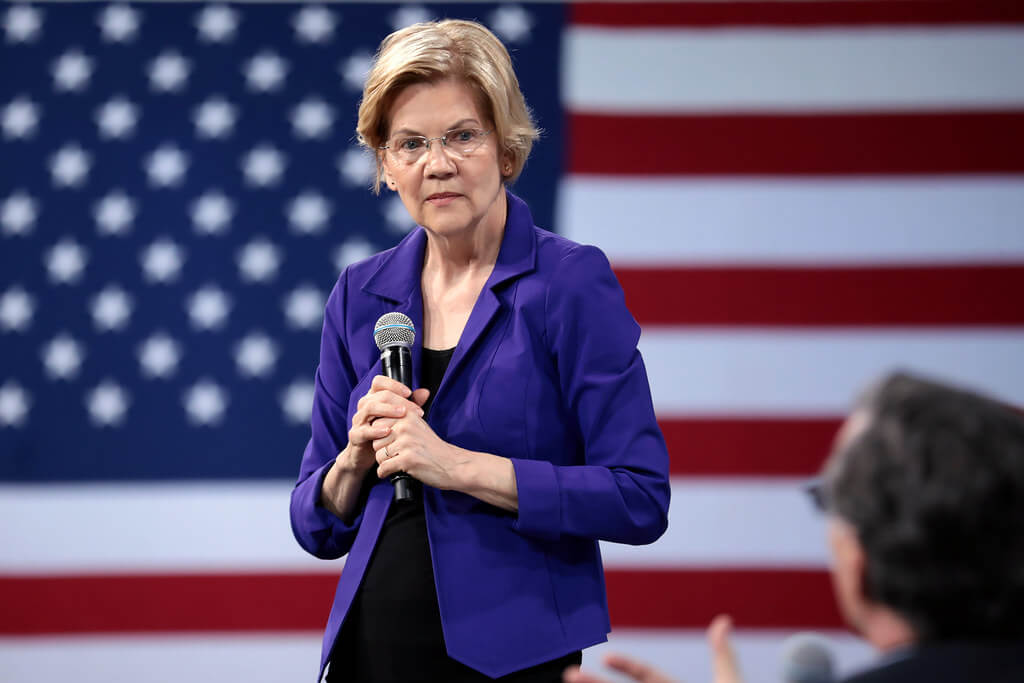Senator Elizabeth Warren Doubles Down on Crypto Criticism Amid Loss of Support
27.07.2024 9:30 1 min. read Alexander Stefanov
Senator Elizabeth Warren has continued her vocal opposition to cryptocurrencies, despite losing some of her legislative backing.
On July 25, during a Senate Committee on Banking, Housing, and Urban Affairs hearing, Warren raised alarms about the national security risks posed by foreign-owned crypto mining operations.
Warren argued that these operations could be exploited by foreign entities to monitor US military activities and jeopardize the nation’s energy infrastructure. She described these mining facilities as environmentally damaging and prone to causing power grid failures due to their high energy consumption.
The senator also expressed concerns about how foreign buyers use cryptocurrencies to acquire mining operations in the US, bypassing traditional financial regulations. She cited a case where a Chinese investor used digital assets to secretly purchase a $6 million mining site in Texas.
Warren is advocating for tighter anti-money laundering laws to address these issues, but her efforts face diminishing support. Republican Senator Roger Marshall recently withdrew his backing from the Digital Asset Anti-Money Laundering Act (DAAMLA), a bill he co-sponsored with Warren in 2022. This leaves 18 lawmakers in favor of the bill. Critics argue that the legislation could stifle the growth of the crypto sector.
-
1
NYSE Parent ICE in Talks for $2 Billion Investment in Polymarket Valued Up to $10 Billion
07.10.2025 16:00 2 min. read -
2
Changpeng Zhao Responds to Criticism, Highlights Binance Efforts to Shield Users
13.10.2025 15:00 2 min. read -
3
Strategy: Is it Undervalued or Overextended After Its Latest Bitcoin Buy?
14.10.2025 13:36 5 min. read -
4
Here’s How Crypto Could Help Nigel Farage Win the Next UK Election
09.10.2025 11:00 3 min. read -
5
Nasdaq Gets Its First Digital Gold Treasury
10.10.2025 20:00 1 min. read
Trump’s White House Expansion Draws Support from Crypto Industry
Several prominent figures and companies from the cryptocurrency and tech industries are reported to have contributed to the Trump administration’s new White House ballroom project.
Polymarket Confirms POLY Token and Airdrop, Prioritizes U.S. Relaunch
Prediction market platform Polymarket is preparing to introduce its long-awaited POLY token alongside an airdrop, signaling a new phase of growth as investor interest and trading activity surge.
Soft CPI Sparks Hope: Is the Fed About to Ease Up?
Fresh inflation figures out of the U.S. hint that price pressures are easing again, setting a calmer tone across financial markets – and giving crypto traders a reason to stay optimistic.
Trump Clears Changpeng Zhao, Citing “Unfair Treatment” Under Biden
In a move that has stunned the crypto industry and reignited debate over past regulatory actions, US President Donald Trump has granted a full pardon to Binance founder Changpeng “CZ” Zhao.
-
1
NYSE Parent ICE in Talks for $2 Billion Investment in Polymarket Valued Up to $10 Billion
07.10.2025 16:00 2 min. read -
2
Changpeng Zhao Responds to Criticism, Highlights Binance Efforts to Shield Users
13.10.2025 15:00 2 min. read -
3
Strategy: Is it Undervalued or Overextended After Its Latest Bitcoin Buy?
14.10.2025 13:36 5 min. read -
4
Here’s How Crypto Could Help Nigel Farage Win the Next UK Election
09.10.2025 11:00 3 min. read -
5
Nasdaq Gets Its First Digital Gold Treasury
10.10.2025 20:00 1 min. read
Senator Cynthia Lummis has challenged the SEC’s lawsuit against Coinbase, arguing the agency is exceeding its authority by regulating crypto through enforcement rather than legislation.
Senator Cynthia Lummis has introduced the "Boosting Innovation, Technology, and Competitiveness through Optimized Investment Nationwide Act of 2024" (Bitcoin Act of 2024).
Senator Cynthia Lummis from Wyoming has proposed a plan to sell part of the Federal Reserve's gold reserves to fund the purchase of one million Bitcoin for a national strategic reserve1.
Cynthia Lummis, a U.S. Senator and pro-crpypto advocate, has criticized the SEC’s approach to cryptocurrency regulations, claiming it hinders the industry’s growth.
A controversial stablecoin bill is now facing mounting opposition in Washington, with Senator Elizabeth Warren leading the charge against what she calls a pathway to “crypto corruption.”
Two U.S. senators have called out the country’s largest banks for failing to pass on the benefits of a high interest rate environment to their customers.
U.S. senators are pushing for new legislation to expand the Secret Service’s role in tackling crimes involving digital assets.
A group of Democratic senators, led by Elizabeth Warren, is pressing Federal Reserve Chair Jerome Powell to implement a significant reduction in interest rates to protect the U.S. economy.
In a renewed effort, a group of bipartisan U.S. senators is advocating for legislation to prevent members of Congress from engaging in stock trading.
The crypto rumor mill is abuzz with news of a sudden Toncoin Dogecoin Dip, as top wallets seem to be rotating funds elsewhere.
One of the well-known crypto analysts known as "Rekt Capital" shared a bullish sentiment on Bitcoin (BTC) despite its recent drop to a six-month low.
US inflation data for September is expected to confirm that prices remain stubbornly high, keeping the Federal Reserve’s path to its 2% target challenging.
Federal Reserve Chair Jerome Powell's recent address at the Kansas City Fed’s Jackson Hole symposium has highlighted a pivotal shift in focus for the central bank.
NFT sales continued to decline in September, with monthly sales volumes failing to rebound.
September could prove to be an important month for the cryptocurrency market as major events such as the presidential debates and Federal Reserve decisions loom on the horizon.
The latest data from the Federal Deposit Insurance Corporation (FDIC) shows a worrying trend in the US banking sector, as unrealized losses continue to rise, reaching over $500 billion.
Shaquille O'Neal, the former NBA star and sports commentator, has reached a settlement in a class action lawsuit tied to his promotion of the Astrals non-fungible token (NFT) project.
Basketball icon Shaquille O’Neal has agreed to pay $1.8 million to settle a lawsuit tied to his promotion of the now-bankrupt crypto exchange FTX, according to new court filings.
Former NBA star Shaquille O’Neal is facing legal scrutiny in an ongoing class-action lawsuit involving Astral NFTs.
SharpLink Gaming (Nasdaq: SBET), the affiliate marketing and gaming software company that has transformed into a major Ethereum treasury player, announced it has expanded its holdings with another 143,593 ETH purchase.


